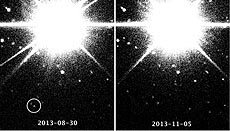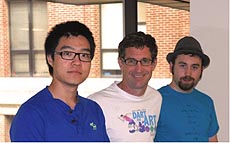Dark Energy Survey discovers new trans-Neptunian objects
 |
| These side-by-side images show the new minor planet 2013 QO95. The circled object in the left picture is roughly 200 kilometers in size and lies just beyond Pluto. The bright star in the image is too faint to be seen with the unaided eye. Images: Dark Energy Survey |
Ever wish you could spend your summer vacation exploring someplace cool? Undergraduate students Ross Jennings and Zhilu Zhang, both of Carleton College, got to explore one of the coolest places in the solar system when they accepted research fellowships at the University of Michigan to work with Professor David Gerdes on a search for trans-Neptunian minor planets with the Dark Energy Survey. This faraway region of the solar system, more than five billion kilometers from the sun, is populated by thousands of small, icy worlds that take centuries to complete one orbit. These trans-Neptunian objects (TNOs) are believed to be leftovers from the primordial cloud that gave birth to the solar system.
To look for TNOs in Dark Energy Survey data, Gerdes and his students examined the 10 fields that DES visits roughly every five days to search for type Ia supernovae. This search uses difference imaging software to detect transient objects such as a supernova that brightens rapidly and then fades over the next few months. But it's also the perfect tool to find TNOs, which move from night to night against the background of fixed stars, yet slowly enough that they can stay in the same field of observation for weeks.
Gerdes, Jennings and Zhang started with a list of nearly 100,000 observations of individual transients, then linked different combinations with trial orbits to see which ones were consistent with a TNO. As more and more points were added to each candidate orbit, the team refined their calculations and made improved predictions for additional observations. By the end of the summer, the team had discovered five new TNOs.
The properties of the new objects reflect the rich dynamical structure of the trans-Neptunian region: One orbits the sun once for every two orbits of Neptune, and another makes two orbits for every five of Neptune. These orbital resonances protect the objects from disruptive close encounters with the giant planet. A third object has a highly elongated, 1,200-year orbit that is among the 50 longest orbital periods known. (Read more about the fourth and fifth objects.)
In the course of this summer project, the students learned a variety of skills, from Python programming to the mechanics of submitting results for publication.
But the most important thing, said Zhang, was this: "You need to really have a lot of enthusiasm for the research you are involved in, because there is a lot of repetition and tedious work involved in research, and it is not about discovering new things every day. However, the joy you get after you finally find something is so special that I haven't felt anything like that before in my entire life."
Now that's cool.
—David Gerdes, University of Michigan
 |
| Planet hunters, from left: Zhilu Zhang (Carleton College), David Gerdes (University of Michigan) and Ross Jennings (Carleton College) |
|